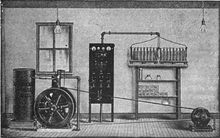Hybrid power

Hybrid power are combinations between different technologies to produce power.
In power engineering, the term 'hybrid' describes a combined power and energy storage system.[1] It does not mean a "method," such as the popular use of hybrid to mean a hybrid electric vehicle like the Toyota Prius. Although the drive train in the Toyota Prius can accurately be described as a hybrid power system.
Examples of power producers used in hybrid power are photovoltaics, wind turbines, and various types of Engine-generators - e.g. diesel gen-sets.[2]
Hybrid power plants often contain a renewable energy component (such as PV) that is balanced via a second form of generation or storage such as a diesel genset, fuel cell or battery storage system. They can also provide other forms of power such as heat for some applications.[3][4]
Hybrid power system
Hybrid systems, as the name implies, combine two or more modes of electricity generation together, usually using renewable technologies such as solar photovoltaic (PV) and wind turbines. Hybrid systems provide a high level of energy security through the mix of generation methods, and often will incorporate a storage system (battery, Fuel cell) or small fossil fueled generator to ensure maximum supply reliability and security.
References
- ↑ Ginn, Claire. "Energy pick n' mix: are hybrid systems the next big thing?". www.csiro.au. CSIRO. Retrieved 9 September 2016.
- ↑ http://www.powerengineeringint.com/articles/print/volume-19/issue-8/features/fuel-savings-make-a-powerful-case-for-hybrid-diesel-generator-systems.html
- ↑ Badwal, Sukhvinder P. S.; Giddey, Sarbjit S.; Munnings, Christopher; Bhatt, Anand I.; Hollenkamp, Anthony F. (24 September 2014). "Emerging electrochemical energy conversion and storage technologies". Frontiers in Chemistry. 2. doi:10.3389/fchem.2014.00079.
- ↑ Ginn, Claire. "Energy pick n' mix: are hybrid systems the next big thing?". www.csiro.au. CSIRO. Retrieved 9 September 2016.